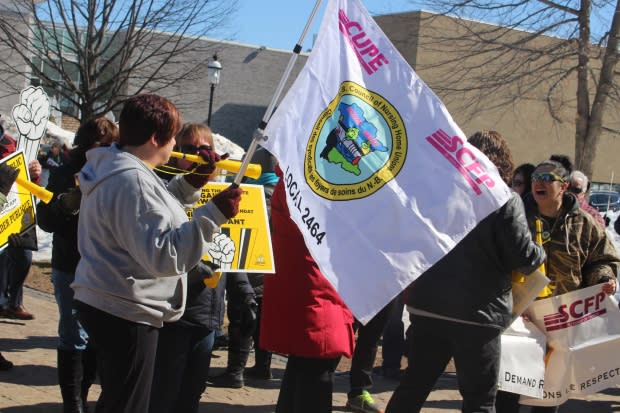Court of Appeal stops nursing home workers from striking
New Brunswick's Court of Appeal has stayed a labour board ruling that would have allowed 4,000 nursing home workers to go on strike.
A three-judge panel delivered the unanimous decision Thursday afternoon, preventing licensed practical nurses, resident attendants and support service workers from walking off the job in the foreseeable future.
Ninety per cent of the workers, who are trying to win higher wage increases, voted in early March to strike, but they haven't been able to strike because of back-to-back court orders.
CUPE lawyer Joël Michaud said the judges ruled there will be no strike until a judicial review of the labour board decision is completed or until further orders from the Court of Queen's Bench.
The labour board decision said provincial legislation deeming nursing home work an essential service is unconstitutional because it doesn't allow workers to fully strike. The province is challenging that decision.
On Thursday, the Appeal Court sided with the province in rejecting an earlier ruling by Court of Queen's Bench Justice Paulette Garnett that would have allowed a strike.
The reasons for the Appeal Court decision will be disclosed later, Michaud said, but it's not clear when.

Patrick Roy, co-ordinator with the New Brunswick Council of Nursing Home Locals, said this latest stay is nothing new.
"It doesn't change anything from what we've been saying from day one," he said. "Without our ability to strike and the way this government is acting is we're into this stage of collective begging. … It's a take-it-or-leave-it mentality from the governmnet."
Disagree on binding arbitration
Premier Blaine Higgs previously said he can't offer nursing home workers a pay increase of more than one per cent raise per year. That's what the province has offered other sectors, and the province thinks it would be unfair to offer one group more.
Higgs also opposes binding arbitration unless the arbitrator takes into account the wages of similar jobs in the public and private sectors. CUPE has rejected that approach, saying it would tie the hands of the arbitrator.
The union has continued to ask for binding arbitration without conditions.
Justin Wies , the lawyer for the New Brunswick Association of Nursing Homes, said a stay is a favourable outcome for the employer.
"We are very happy with the decision," he said. "It means residents will be protected."
He said an ideal situation would be to strike a deal as soon as possible, because the prolonged negotiations are taking a toll on staff and patients.
"Uncertainty is never good."
Garnett's reasoning
Garnett had lifted a temporary stay that barred the workers from striking. She felt further court meddling would cause harm to workers, residents and the public. She also felt talks had already gone on for too long.
But in his arguments to the appeal judges, province's lawyer Christian Michaud said Garnett erred in her decision because she did not put enough weight on the irreparable harm a strike would cause elderly residents and their families.
He also argued that it's improper for a labour board to decide on constitutionality of provincial legislation without offering alternatives or giving the province time to come up with a strategy. But this argument will be considered more thoroughly in the judicial review.
That review is scheduled for May 24 in Moncton, but it will likely be many more months before a decision.
The province has taken part in negotiations between the nursing home workers and the New Brunswick Association of Nursing Homes, but the talks have stalled. Pay has been the main sticking point.

